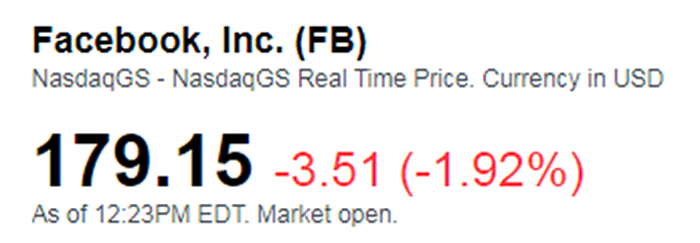Whenever a stock price drops after a great earnings report, there is always a sense of confusion among traders.
If you take a look at social stock trading websites such as StockTwits, you will see questions such as “Why is it dropping when the ER beat?” or “Why isn’t it going up?”
A good example is Facebook’s Q3 2017 earnings report. It crushed all expectations, yet the stock price dropped afterwards. Traders were quick to register their disappointment, as many of them had expected the price to “pop”.
Well, the stock price did pop, for a little while, in the after hours market. However, it wasn’t long before it fell back to earth again.

A screenshot of Facebook’s stock price after it’s 2017 Q3 ER.
Why does a stock price drop after beating earnings?
Buy the rumor, sell the news.
In many cases, the price of a good earnings report is already priced into the market.
For instance, in the days leading up to Facebook’s Q3 2017 report, many analysts were expecting the company to “crush expectations”.
As a result, investors bought in and the price continued to rise. Expectations were high, to say the least.
However, once the news broke and these expectations became a reality, many people decided to cash in on their profits.
This is sometimes referred to as “buy the rumor, sell the news.”
In other words, buy because you believe that it’s going to beat and then sell as soon as it does, thereby locking in your profits.
Lowered guidance.
A lot of beginner traders will see an earnings beat and automatically assume that everything is good.
However, this might not be the case.
A company can post an earnings beat while also lowering their earnings guidance.
For instance, during the earnings report, they might lower their predictions for future sales or profits. This lowered guidance can frighten investors and lower the share price.
For example, Nokia’s 2020 Q4 earnings beat estimates. However, the company also warned that 2021 would be a challenging year. This is mostly due to the fact that it is facing market share loss and price erosion in North America.
As a result, the share price of Nokia continued to drop.
Sell before other traders sell.
Because “profit taking” is so prevalent after a good earnings report, many traders feel as though they need to sell before other traders begin to sell.
If I think that other traders are going to lock in their profits and drive the price down, I am more likely to sell myself.
Then, if it does drop, I can simply buy it back on the dip. If it doesn’t drop, who cares? I’ve made my profit and can now move on to the next stock.

$BABA also dropped after a successful Q3 2017.
Hedge funds.
The high volume after a company reports earnings often provides large hedge funds with the opportunity to exit a large position without knocking down the price of the stock.
If the ER is a beat, then there will be plenty of buyers to keep the price afloat.
Panic selling.
As traders take their profits and the stock price declines, a sense of panic can start to set in. This leads to further selling and a steeper decline in the price of the stock.
Remember that the market isn’t always rational, as traders will often make decisions that are based on their emotions.
In other words, the long term fundamentals of a company might not matter to someone who is watching their profits evaporate by the minute.
If you take the factors above into account, you can easily see why a stock can drop after an earnings beat. Fortunately, if the fundamentals of the company are strong and there isn’t any cause for concern, the price will often bounce back in the short-to-mid term.